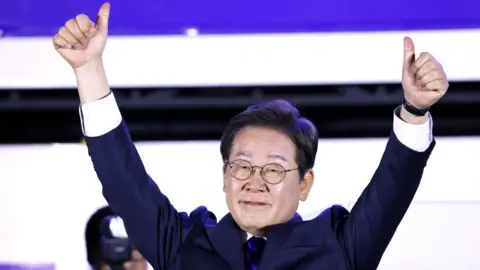South Korea’s snap presidential election on 3 June 2025 culminated in a decisive victory for Lee Jae-myung, the liberal Democratic Party candidate, who secured 48.7% of the vote with over 90% of ballots counted. His main rival, Kim Moon-soo of the conservative People Power Party (PPP), garnered 42.2% and conceded defeat, congratulating Lee in a brief speech. The election, triggered by the impeachment and removal of former President Yoon Suk Yeol, saw a remarkable 79.4% voter turnout, the highest since 1997, reflecting the intense public engagement following months of political turmoil. Lee, sworn in on 4 June, now faces the daunting task of uniting a polarised nation and addressing pressing economic and geopolitical challenges.
The election was a direct response to Yoon’s controversial declaration of martial law on 3 December 2024, which lasted six hours but plunged South Korea into chaos. Yoon’s impeachment by the National Assembly on 14 December, followed by the Constitutional Court’s confirmation on 4 April 2025, led to a leadership vacuum, with three acting presidents—Choi Sang-mok, Han Duck-soo, and Lee Ju-ho—helming the country in quick succession. Lee Jae-myung, who narrowly lost to Yoon in 2022, capitalised on public outrage over the martial law debacle. His campaign framed the election as a referendum on Yoon grafted actions, promising to prevent such crises and restore democratic stability.
Lee, a 61-year-old former human rights lawyer and governor of Gyeonggi Province, campaigned on reducing economic inequality, reviving a sluggish economy, and fostering pragmatic diplomacy. His pledges include a four-and-a-half-day workweek to address South Korea’s gruelling work culture and relocating the presidential office to Sejong City to establish it as the administrative capital. However, Lee’s victory is not without controversy. He faces multiple ongoing trials for alleged election law violations and bribery, which he denies, claiming they are politically motivated. The question of whether presidential immunity will apply to these cases remains unresolved, potentially casting a shadow over his tenure.
On the international front, Lee has vowed to strengthen the US-South Korea alliance while pursuing dialogue with North Korea to ease tensions and restore military hotlines. He advocates a cautious approach to US President Donald Trump’s 25% tariffs on South Korean exports, criticising rushed negotiations and prioritising long-term national interests. Lee also aims to mend strained ties with China, South Korea’s largest trading partner, which deteriorated under Yoon’s confrontational stance. His diplomatic balancing act will be critical as South Korea navigates a global trade war and North Korea’s growing ties with Russia.
Kim Moon-soo, a former labour minister and staunch Yoon supporter, struggled to distance himself from the former president’s legacy, which analysts say cost him broader appeal. Minor candidate Lee Jun-seok of the New Reform Party secured 7.7% of the vote, hinting at a potential shift in the conservative landscape. South Korea’s economy, battered by recent instability and tariff threats, showed signs of recovery, with the KOSPI index rising post-election, though it remains below regional peers due to the “Korea discount” tied to corporate governance issues.
Lee’s immediate inauguration, without the usual two-month transition, underscores the urgency of his mandate. As South Korea’s 14th president, he must bridge deep societal divides, address economic woes, and navigate a volatile global stage. His victory signals a public rebuke of Yoon’s legacy, but the challenges ahead will test Lee’s ability to deliver on his promise of a “real Republic of Korea.”
newshub finance



Recent Comments